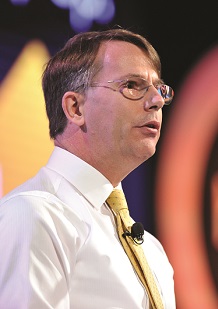Budget boost of £1.6bn aimed at activity and vital care
The principles, to be used to develop its 2018/19 operational plan, include funding demand that is driving clinical commissioning group deficits this year, setting realistic emergency care growth plans and protecting funding for cancer, mental health and primary care. However, it admitted other NHS constitution targets, such as elective waiting times, are likely to slip.
In the November Budget, chancellor Philip Hammond said the additional funding next year should allow the NHS to improve waiting list performance.
The commissioning body’s November board meeting heard that it would engage widely over the next four months to finalise the plan. This is likely to be approved at the NHS England board meeting scheduled for 29 March.
NHS England chief financial officer Paul Baumann (pictured) presented month seven figures, showing a CCG year-to-date overspend of £267m, with a projected year-end overspend of £223m. He said regular monitoring of risks and mitigations had found further net risks to the CCG position of £550m, most of which were likely to crystallise before the end of March.
These included temporary risks such as drug price pressures. Even when CCG mitigations and NHS England interventions were taken into account, the underlying position was a deficit of around £500m.
‘There is an underlying and, in my judgement, a persisting deficit in the CCG sector, which, even when I strip out all of the temporary factors, both positive and negative, still seems to be round about the £500m mark,’ he said.
A board paper on 2018/19 planning said CCGs were paying for £500m more patient care than they could budget for, because £560m was being held back (£360m from CCGs and £200m by NHS England) as a system risk reserve. In practice, the £500m overspend will be funded from the risk reserve this year.
NHS England chief executive Simon Stevens said patients would continue to need these services in 2018/19.
The first principle guiding its operational plan should be that this activity should be funded from the additional £1.6bn. The second principle focused on emergency care. While progress had been made on reducing A&E attendances, there was no respite in social care pressures and vanguard funding ends in April.
‘First and foremost, people look to the NHS to provide safe and responsive urgent and emergency care services,’ commented Mr Stevens. ‘So we have got to make sure that those are funded properly going into next year.’
Moving on to the third principle, Mr Stevens recommended that planned investment in mental health, cancer and primary care services be protected. The NHS must address unmet need in mental health and cancer care, while ‘it would not make sense to go back on commitments’ in primary care, which he said was the foundation of the NHS and helped moderate demand going into the hospital sector.
As a fourth principle, he said, the commissioning body must be realistic about what can be achieved with the remaining funding. ‘We should be stretching but practical about what that should look like, so as not to set unattainable goals for staff who are already working under considerable pressure,’ Mr Stevens said.
The final principle covered the announcement that the Treasury would be funding Agenda for Change pay rises.
Mr Baumann said the additional £1.6bn amounted to a weighted real terms growth per head of 0.9%.
The commissioning sector had overspent by almost £54m after seven months of the financial year, but forecast a small underspend (about £19m) by year-end. CCGs forecast their overspend would be £223m at year-end, again offset by underspends in central budgets (£207m) and direct commissioning (£16m). Following technical adjustments – a £42m adverse variance – the overall forecast position, before additional risks, is an £18.6m underspend.Related content
This event is for those that will benefit from an overview of costing in the NHS or those new to costing and will cover why we cost and the processes.
Mindset and the neuroscience of leadership - Lunch and Learn